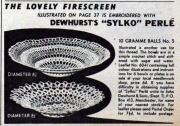John Dewhurst and Sons: Difference between revisions
No edit summary |
No edit summary |
||
| Line 15: | Line 15: | ||
of [[Valley Mill, Elland| Valley Mills]], Elland, Yorks, as part of the Ingham, Dewhurst, Illingworth Group. | of [[Valley Mill, Elland| Valley Mills]], Elland, Yorks, as part of the Ingham, Dewhurst, Illingworth Group. | ||
Dewhurst’s became famous for their sewing cotton, marketed under the [[Sylko|Dewhurst Sylko]]. brand. | |||
1789 The company was established by [[Thomas Dewhurst]] in Skipton, Yorkshire when he bought a building in which to spin cotton | |||
By 1821 Scalegill Mill, in Kirkby Malham, had been taken by '''John Dewhurst and Co''' of Skipton.<ref>[http://www.kirkbymalham.info/KMI/kirkbymalham/scalegill.html Kirkby Malham.info]</ref> | |||
'''John''' and '''Isaac Dewhurst''' invested money in equipment, making it an important production unit. | '''John''' and '''Isaac Dewhurst''' invested money in equipment, making it an important production unit. | ||
| Line 21: | Line 25: | ||
1825 Their insurance policy valued the company as: Scalegill Cotton Mill £800; Mill Work £300; Machinery £1,500; Stock £25; Panhouse adjoining £15; Stock therein £10; Stable, Warehouse and Counting House £50; Stock therein £300; | 1825 Their insurance policy valued the company as: Scalegill Cotton Mill £800; Mill Work £300; Machinery £1,500; Stock £25; Panhouse adjoining £15; Stock therein £10; Stable, Warehouse and Counting House £50; Stock therein £300; | ||
1828 The Belle Vue Mill was built as a woollen mill. | |||
1834 They later also ran the mill at Airton, which they leased in 1834. | 1834 They later also ran the mill at Airton, which they leased in 1834. | ||
| Line 30: | Line 34: | ||
When Dewhurst's lease ran out, they evidently did not want to renew it again and the mill was again advertised for rent. | When Dewhurst's lease ran out, they evidently did not want to renew it again and the mill was again advertised for rent. | ||
1869 [[John Dewhurst and Sons]] manufactured sewing cotton and cotton yarn for spinning. | |||
1888 The company became a limited company and employed 1,000 people. | |||
1897 Acquired by the [[English Sewing Cotton Co]].<ref>The Times, December 2, 1897</ref> | 1897 Acquired by the [[English Sewing Cotton Co]].<ref>The Times, December 2, 1897</ref> | ||
Latest revision as of 09:11, 27 February 2024











of Belle Vue Mills, Skipton
of Valley Mills, Elland, Yorks, as part of the Ingham, Dewhurst, Illingworth Group.
Dewhurst’s became famous for their sewing cotton, marketed under the Dewhurst Sylko. brand.
1789 The company was established by Thomas Dewhurst in Skipton, Yorkshire when he bought a building in which to spin cotton
By 1821 Scalegill Mill, in Kirkby Malham, had been taken by John Dewhurst and Co of Skipton.[1]
John and Isaac Dewhurst invested money in equipment, making it an important production unit.
1825 Their insurance policy valued the company as: Scalegill Cotton Mill £800; Mill Work £300; Machinery £1,500; Stock £25; Panhouse adjoining £15; Stock therein £10; Stable, Warehouse and Counting House £50; Stock therein £300;
1828 The Belle Vue Mill was built as a woollen mill.
1834 They later also ran the mill at Airton, which they leased in 1834.
1838 Isaac Dewhurst was still running the Scalegill mill.
1839 He was granted a further 9 year lease by William Rookes Leedes Serjeantson on 12 May, at £128 per annum.
When Dewhurst's lease ran out, they evidently did not want to renew it again and the mill was again advertised for rent.
1869 John Dewhurst and Sons manufactured sewing cotton and cotton yarn for spinning.
1888 The company became a limited company and employed 1,000 people.
1897 Acquired by the English Sewing Cotton Co.[2]
1947 British Industries Fair Advert for 'The World's Best Worsted Yarns from Yorkshire'. Manufacturers of the following Branded Knitting Wools, "Valleydew", "Rippledew", "Rocdew", "Purldew", "Lozeydew", "Shimmerdew", High Class Botany Yarns in either White or Coloured, Spun on the English or Continental Systems. (Textiles Section - Earls Court, Ground Floor, Stand No. 166) [3]
Part of the Ingham, Dewhurst, Illingworth Group
See Also
Sources of Information
- ↑ Kirkby Malham.info
- ↑ The Times, December 2, 1897
- ↑ 1947 British Industries Fair Advert 459; and p83

